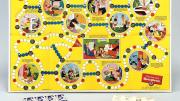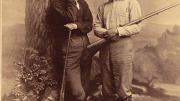Women After All: Sex, Evolution, and the End of Male Supremacy, by Melvin Konner, Ph.D. ’73, M.D. ’85 (Norton, $26.95). A sweeping, searching argument, from “biology and…the domains of our thoughts and feelings influenced by biology,” that “women are not equal to men; they are superior in many ways, and in most ways that will count in the future.” The author is an anthropologist, who also engages in neuroscience, at Emory.
Wicked Problems, Workable Solutions, by Daniel Yankelovich ’46, G ’49, K ’96 (Rowman & Littlefield, $36). Drawing on a life’s work investigating American public opinion, the author probes ways to engage citizens in reaching better public decisions and solutions to intractable issues.
Two useful collections: Byline Richard Wright, edited by Earle V. Bryant, Ph.D. ’79 (University of Missouri, $60). The editor, of the University of New Orleans, has collected and annotated much of the Daily Worker journalism and two New Masses essays that preceded Wright’s iconic Native Son and Black Boy. And Edward P. Kohn ’90 has edited A Most Glorious Ride (Excelsior Editions/SUNY, $29.95), Theodore Roosevelt’s diaries from 1877 to 1886. Occasional “studying with a will” and much partying, shooting, and recording of “prettiest girls,” such as Miss Emily Swan, with whom TR “had several very pleasant rows and rides.”
Geek Heresy, by Kentaro Toyama ’91 (PublicAffairs, $27.99). The co-founder of Microsoft Research India, where he studied the intersection of technology with socioeconomic issues among some of the world’s poorest people, now writes from the University of Michigan. The rapid spread of digital technology, he observes, has coincided with persistent, and perhaps worsening, poverty. This “recovering technoholic” makes the case for “rescuing social change from the cult of technology.”
Biology basics: In Tools for Critical Thinking in Biology (Oxford, $49.95), venerable teacher Stephen H. Jenkins, Ph.D. ’75, now emeritus from the University of Nevada, Reno, attempts to teach the basics through applying the fundamental tenets of the scientific process. The Developing Genome: An Introduction to Behavior Epigenetics, by David S. Moore, Ph.D. ’88 (Oxford, $39.95), is an approachable primer on the frontier field of studying which genes are switched on, and how they are influenced by experience. The author is at Pitzer College and Claremont Graduate University.
Cora Du Bois: Anthropologist, Diplomat, Agent, by Susan C. Seymour, Ph.D. ’71 (Nebraska, $39.50). The author, an anthropologist emerita at Pitzer College, profiles Du Bois, who did pioneering anthropological field work among Native Americans and in Indonesia and Sri Lanka; served in the Office of Strategic Services during World War II; and was appointed to the Zemurray chair at Radcliffe and to tenure in the anthropology department, before presiding over the American Anthropological Association.
The Physicist and the Philosopher, by Jimena Canales, Ph.D. ’03 (Princeton, $35). The author, a University of Illinois historian of science, uses a celebrated debate between Albert Einstein and Henri Bergson about the nature of time to illuminate the colliding worldviews of scientific and humanistic understanding.
Galápagos Regained, by James Morrow, M.A.T. ’70 (St. Martin’s, $28.99). In his tenth novel, the author imagines an assistant to Charles Darwin, one Chloe Bathurst, seeking fortune and fame by appropriating and applying his theory of evolution. Those not fond of tortoises, be warned.
Being Nixon: A Man Divided, by Evan Thomas ’73 (Random House, $32). The fluid biographer of Dwight Eisenhower, Robert Kennedy, and others turns his attention to a darker subject, providing amusing reminders of RMN’s bipolar attitude toward Harvard and Harvardians (“None of them in the Cabinet, do you understand?”)—a good many of whom, like Henry Kissinger and Daniel Patrick Moynihan, he relied upon for the largest matters of his presidency.
A pair of primers. What’s Your Future Worth? by Peter Neuwirth ’78 (Berrett-Koehler, $18.95 paper). A consulting actuary advises on balancing time, risk, and money by employing present value; in the author’s note, he says the technique figured in his decision about whether to get married. Remember: he’s an actuary. Harvard Law student Tyler Vigen amusingly illustrates different and bone-headed analyses in Spurious Correlations (Hachette, $20), a humorous guide (the first example is the notorious simultaneous rise of human births and the stork population in late nineteenth-century Holland). If the law doesn’t pan out…
The Allure of Order, by Jal Mehta, associate professor of education (Oxford, $24.95 paper). A sobering history of the “troubled quest to remake American schooling” through attempts to impose external accountability on teaching—most recently, via the No Child Left Behind Act. For an on-the-ground look at classrooms and students, How Did You Get Here? by Thomas Hehir, Pascucci professor of practice in learning differences, and Laura A. Schifter (Harvard Education Press, $70 cloth, $35 paper), tells the stories of 16 students with diverse disabilities who made their way to, and through, Harvard.
Tangible Things: Making History through Objects, by Laurel Thatcher Ulrich, 300th Anniversary University Professor, et alia (Oxford, $49.95, paper). A quartet of authors and a photographer build upon a 2011 exhibition drawn from Harvard collections to illustrate the importance of materially based history.
The world of work: Pedigree: How Elite Students Get Elite Jobs, by Lauren A. Rivera, Ph.D. ’09 (Princeton, $35). An associate professor of management at Northwestern’s Kellogg School shows through sociological research that mobility and merit are hollowing out, as top-tier employers gravitate toward affluent, upper-class applicants. In entirely different realms, Harvard Magazine’s Craig Lambert ’69, Ph.D. ’78, who retired as deputy editor (a real job) last year to finish writing a book (another real job), has delivered Shadow Work: The Unpaid, Unseen Jobs That Fill Your Day (Counterpoint, $26). Odds are, he had to book his own flights and assign his own seats and schlep his own bags on his book tour. For more, see harvardmag.com/lambert-15.









